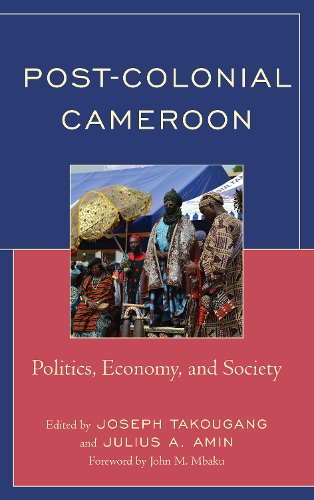
Post-Colonial Cameroon: Politics, Economy, and Society
(Hardback)
Publishing Details
Post-Colonial Cameroon: Politics, Economy, and Society
By (Author) Joseph Takougang
Edited by Julius A. Amin
Contributions by Fonkem Achankeng
Contributions by Peter Ngwafu
Contributions by Walter Gam Nkwi
Contributions by Roland N. Ndille
Contributions by Honor Mimche
Contributions by Christian Bios Nelem
Contributions by Achille Pinghane Yonta
Contributions by Nobert Lengha Tohnain
Bloomsbury Publishing PLC
Lexington Books
13th June 2018
United States
Classifications
Professional and Scholarly
Non Fiction
African history
International relations
967.1104
Physical Properties
Hardback
472
Width 158mm, Height 239mm, Spine 32mm
780g
Description
In this unique volume, leading scholars examine how Cameroonians organize and experience their lives under Cameroonian leadership and local responses to that leadership. The volume offers essential case studies that allow us to examine the lives of ordinary people in post-colonial Africa through five lenses: politics, society and culture, economy, international relations, and migration. It places the nations contemporary challenges within a broader political, economic, and socio-cultural context, and uses that to make recommendations for future directions. The book also celebrates areas in which the country has done well and calls on its citizens to build on those achievements. This volume is forward-looking and as such raises important questions about issues of development, ethnicity, wealth, poverty, and class.
Reviews
This impressive collection of essays by Cameroonian scholars both abroad and at home presents a wide variety of insights into contemporary Cameroon with sections on politics, economy, society and culture, international relations, migration, and important concluding comments on the current political crisis. -- Mark Dike DeLancey
This volume is an extraordinary treat for scholars of Cameroon and African historiography. Fusing a wide range of themes including previously overlooked issues such as return migration, representations of femininity and motherhood, religious modernity, environmental degradation and nature protection, this volume makes a particularly expedient case for robust interdisciplinary conversations on current Cameroonian society. Though much has been written about Cameroons latter-day Machiavellian political culture, epitomized by Paul Biyas enduring three decades of unrepentant misrule, this monograph breaks new ground by moving the spotlight away from the autocrat himself and focusing instead on the resilience of everyday life in the postcolony. By synthesizing sharp analysis of politics, the economy, society and culture and international relations, this volume deepens our knowledge of todays Cameroon and its emergent diasporic spaces. This multidisciplinary effort, predictably has brought together seasoned and junior scholars, both Anglophone and Francophone, home-based and diasporic, women and men dedicated to the enterprise of knowledge production that lightens the murky and sometimes sleepy alleys of a postcolony yet to rise to its herculean potentials. -- Jude Fokwang, Regis University
Amin and Takougang have put together an impressive roster of experts on Cameroon whose collective work is a first-rate, comprehensive, and critical assessment of Cameroons timid attempt to forge a nation out of diverse and competing linguistic, ethnic, and political institutions. The contributors provide varied perspectives that capture a perpetually restless country, but one teeming with enviable human and natural resources which its leadership has failed to summon. Indeed, the editors underscore the brief optimism that welcomed President Paul Biya following the resignation of his predecessor. The work concludes that the brutal repression of peaceful demonstrators and the rise of secessionists movement are direct consequences of the Biya decades and could be the defining event in the history of the country. -- B. Lemnyoi Bongang, Savannah State University
Author Bio
Joseph Takougang is professor of African history at the University of Cincinnati. Julius A. Amin is professor of African history and alumni chair in humanities at the University of Dayton.
